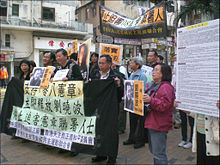Charter 08
[1] It was published on 10 December 2008, the 60th anniversary of the Universal Declaration of Human Rights, adopting its name and style from the anti-Soviet Charter 77 issued by dissidents in Czechoslovakia.
[5] In 2009, one of the authors of Charter 08, Liu Xiaobo, was sentenced to eleven years' imprisonment for "inciting subversion of state power" because of his involvement.
[6] The Charter calls for 19 changes including an independent legal system, freedom of association, the elimination of one-party rule and privatization of all enterprises and farm land.
After experiencing a prolonged period of human rights disasters and a tortuous struggle and resistance, the awakening Chinese citizens are increasingly and more clearly recognizing that freedom, equality, and human rights are universal common values shared by all humankind, and that democracy, a republic, and constitutionalism constitute the basic structural framework of modern governance.
[9] On 8 December 2008, two days before the 60th anniversary of the United Nations General Assembly's adoption of the Universal Declaration of Human Rights, Liu Xiaobo was detained by police, hours before the online release of the Charter.
"[11][12] Several Nobel Laureates wrote a letter to President Hu Jintao asking for his release;[9] in response, the Chinese government suppressed them:[13] at least 70 of its 303 original signatories were summoned or interrogated by police while domestic media were forbidden to interview anyone who signed the document.
[20][21][22] David Stanway reported in The Guardian that it "has been hailed as the most significant act of public dissent against China's Communist party since the Tiananmen Square pro-democracy protests were brutally crushed in 1989.
